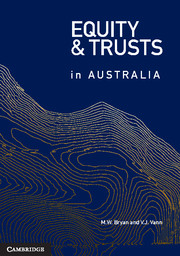Book contents
- Frontmatter
- Contents
- Preface
- Table of Cases
- Table of Statutes
- Abbreviations
- Part A Introduction
- Part B Equitable Remedies
- Part C Equity, Contract and Property
- Part D Equitable Obligations
- Part E Express Trusts
- Part F Performing the Trust
- 17 Trustees’ Duties and Powers
- 18 Investment of Trust Funds
- 19 Trustees’ Rights and Liabilities
- Part G Breach of Trust
- Part H Non-Consensual Trusts
- Index
- References
17 - Trustees’ Duties and Powers
from Part F - Performing the Trust
- Frontmatter
- Contents
- Preface
- Table of Cases
- Table of Statutes
- Abbreviations
- Part A Introduction
- Part B Equitable Remedies
- Part C Equity, Contract and Property
- Part D Equitable Obligations
- Part E Express Trusts
- Part F Performing the Trust
- 17 Trustees’ Duties and Powers
- 18 Investment of Trust Funds
- 19 Trustees’ Rights and Liabilities
- Part G Breach of Trust
- Part H Non-Consensual Trusts
- Index
- References
Summary
Introduction
The trust is a legal relationship involving the trustee owning an asset for the benefit of another, the beneficiary, or for recognised charitable or non-charitable purposes. This form of wealth management presents opportunities for the trustee to betray the trust reposed in him. Equity imposes strict obligations on the trustee to ensure the trustee's proper performance. The duties are enforceable by the remedies discussed in part B, and also by the award of the constructive trust discussed in chapter 23, all of which are designed not only to provide complete relief for the trust but also to deter wrongdoing.
A significant number of positive duties are imposed on a trustee. Failure to perform these duties constitutes a breach of trust. Additionally, the trustee is subject to the fiduciary obligations. Instead of requiring positive action from a trustee, these require the trustee to refrain from making an illicit profit from the trust, or allowing a conflict of interest or duty to exist. Fiduciary obligations apply equally to trustees and other fiduciaries and will not be discussed further in this chapter except insofar as they are reflected in particular duties.
The first part of this chapter explains the obligations imposed on a trustee. This is followed by an examination of a trustee’s discretionary powers. In both cases the focus will be on express trusts, both private and charitable. Resulting and constructive trustees are also subject to duties. These trusts do not, however, impose extensive obligations on the trustee. The principal obligation is to transfer property to the beneficiary entitled under the resulting or constructive trust.
- Type
- Chapter
- Information
- Equity and Trusts in Australia , pp. 278 - 303Publisher: Cambridge University PressPrint publication year: 2012



